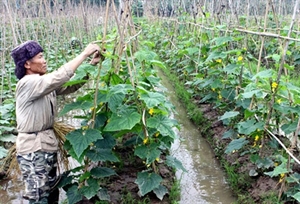
Good agricultural practices (GAP) are considered the main strategy for developing Vietnam's farming. They involve turning out safe and high-quality produce that can be certified free of any dangerous toxins.
 |
| A farmer tends to his cucumber crop in Nhan Nghia Commune, Ha Nam Province |
Good agricultural practices (GAP) are considered the main strategy for developing Vietnam's farming. They involve turning out safe and high-quality produce that can be certified free of any dangerous toxins.
Clean farming techniques are still a novelty in the country, despite the known presence of war-time chemicals and the continued use of sprays and even fertilisers that can contaminate produce.
Slowly, throughout Vietnam, some farmers, influenced by a growing demand for "safe" fruit and vegetables, are switching back to traditional methods which are usually much healthier.
This includes using more farm-made mulch and trying to develop ways of growing crops without having to resort to chemical sprays.
The end result is produce that can be "certified" to be safe and free from all poisons. The boxes of produce and sometimes the individual items of fruit are given labels stating that they were grown in toxin-free soil and without harmful sprays to repel insects.
Already in Hanoi there are a dozen or so organic food outlets. Some of them are topped up daily with first class produce, some of it co-produced by French nationals on farms in nearby hill regions.
However, the introduction of the so-called "new" GAP system in Vietnam has met a series of obstacles.
This was revealed at a recent conference on GAP and the trend towards growing safe fruit and vegetables held in Hanoi.
Acting director of the agriculture ministry's Cultivation Department Pham Dong Quang said that the ministry had set up a legal framework and an itinerary to apply GAP based on the Law on Food Safety issued in 2011.
Farmers wanting to join the scheme will have to change some of their farming habits, even if the cost of doing so is more expensive.
Nguyen Thi Kim Oanh, head of the Hanoi Safe Food and Vegetable trading floor transaction division, said there was a great demand for safe vegetables, but little was being produced, despite much investment.
Oanh said slack management had even led to poor quality fruit and vegetables being sold at big supermarkets, including Big C and Metro.
"This seriously affects customers' belief in food quality. Once they are disappointed, they will lose interest in trying to buy safe, quality produce, even if they have the money," she said.
She added that some farmers had been growing quality produce, but they did not know where or how to market it.
Nguyen Thi Tan Loc, an expert of the Vegetables Research Institute, said that places for cleaning and bundling the vegetables were limited.
Most of them did not have modern production lines or equipment to handle big orders for export - and for supermarkets and restaurant chains.
Loc said that seed for quality crops often had to be imported at high expense.
The Ministry of Agriculture and Rural Development is developing policies to help farmers resolve their difficulties in selling safe vegetables, such as encouraging social organisations and co-operatives to set up production chains to take care of the whole process.
Vietnam has nearly 823,700ha of land growing about 14 million tonnes of vegetables per year. About 85 percent is for domestic use and the remainder for export.
Last year, more than 570 VietGAP certificates were issued to enterprises for producing vegetables, fruit, rice, tea and coffee.
(Source:VNA)




